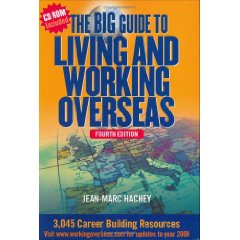After the NAFSA conference in LA, I bounced up to San Francisco to visit with three Alliance members, all of whom are involved in international exchange in different ways. Check these three orgs out if you’re looking for international opportunities in the Bay area, or if you’re just trying to get a better feel for the kind of international work that is out there:
Camp Counselors USA, or CCUSA: Bringing foreigners to the U.S. to work as camp counselors is only one part of what they do. As official J-1 visa sponsors, CCUSA also runs Work Experience USA, a program that facilitates the State Department’s Summer Work and Travel program, on which participants come to work in the U.S. for four months during their summer holidays from college (you know those Chileans who operate the ski lifts in Vale, or those Poles who work the boardwalk in Rehoboth Beach? All participants in the Summer Work and Travel Program). CCUSA also sends Americans abroard for work experiences. All told, they place about 35,000 participants in summer camps, ski areas, hotels, restaurants, and other work environments around the world.
CCUSA has a staff of around 40 or so, many of whom are young. The atmosphere around the office was laid back yet hard-working, somehow fitting (at least I thought) of their location in Sausalito (which I associate with beatnicks, though it’s mostly tourists these days).
The Institute of International Education/West Coast Center: An affiliate of the larger IIE, the West Coast Center brings international leaders from around to world to San Francisco on such programs as:
- International Visitor Leadership Program (IVLP)
- Leadership Development Program for Mobilizing Reproductive Health (LDM)
- Women in Technology (WIT)
- Komen Global Initiative for Breast Cancer Awareness
The West Coast Center has a staff of about 30 employees (again many young, all internationally-oriented) and, importantly, 20 volunteers. I talked with several of their volunteers and many of them were doing three-month stints with the organization to gain experience and contacts that would hopefully help them move into full-time international work. They emphasized that they are only “volunteers” in name, but the work they were doing was essentially that of a staffer (the regular staffers emphasized they couldn’t do it without the volunteers). The volunteers also spoke in gushing terms about the benefit of such a professional volunteer position in gaining practical career experience.
Intrax Cultural Exchange: A unique organization in that it has both for-profit and non-profit arms (CCUSA and IIE are nonprofits). Intrax is also a J-1 visa sponsor and the umbrella organization for several affiliate organizations: AYUSA Cultural Youth Exchange, the nonprofit arm, which runs State Department high school exchange programs such as the Youth Exchange and Study Program (YES); Intrax Career Development, which runs Summer Work and Travel, Intern, and Trainee programs, all of which are State Department sponsored and J-1 visa programs; and Au Pair Care, which facilitates the placement of foreign au pairs with American families.
Intrax has about 250 staff worldwide (130 or so in San Fran), (yet again) many of whom are young and all of whom are internationally oriented. While CCUSA’s office somehow fit its Sausalito location, the same can be said of Intrax fitting its downtown, Financial District location. It struck me as a smooth, well-oiled organization filled with passionate people who truly enjoy the work they do.




